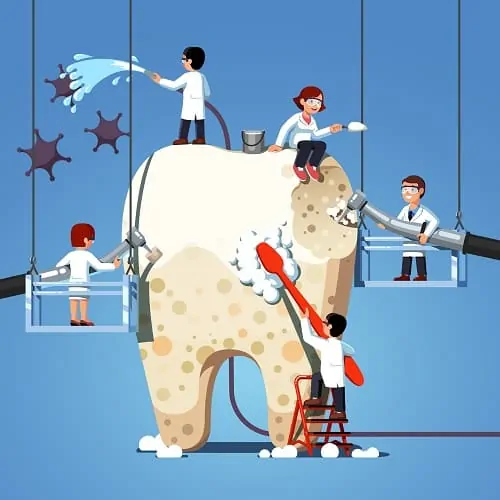
You’ve probably heard your pediatric dentist in Spring talk about plaque and why it’s important to limit plaque buildup. But what exactly is plaque? How does it build up in the first place? What happens if plaque isn’t removed? Why is plaque bad? There are so many questions surrounding plaque, but not to worry, we have all of your answers right here.
Before we can dive into why plaque is bad and why it’s important that it be removed from teeth, we need to know what it is. Essentially, dental plaque is a sticky substance that forms as a result of mixing food, drinks, and saliva together. It’s loaded with bacteria and can be either clear or dull yellow in color. Once it’s formed, plaque will often settle in between teeth and up along the gum line. Dental plaque is constantly being produced in our mouth throughout the day, which is one reason why brushing both morning and night is crucial to removing plaque. If left alone, plaque will build up and cause a whole heap of dental problems.
Everyone has plaque on their teeth. It’s natural. But when there’s too much plaque or when plaque isn’t removed every day, it can buildup and lead to some bad news for teeth. An abundance of plaque can easily lead to decay and cavities, as well as gum disease and gingivitis. Furthermore, if plaque continues to linger around, it will harden into tartar. All of the problems caused by plaque buildup will require treatment from your pediatric dentist in Spring.
The most obvious way to remove plaque is to brush your teeth. But simply brushing may not be enough to rid your mouth of damaging plaque. It’s crucial that children brush their teeth twice a day for two minutes each time. A proper brushing technique is also important to plaque removal. Make sure the toothbrush is at a 45-degree angle and each part of each tooth — including fronts, backs, bottoms, and up along the gum line — is gently scrubbed. Don’t stop there. Also, encourage your child to floss at least once a day. This will help remove pesky plaque buildup that has settled in between teeth. Lastly, rinse with water after every meal to remove food particles from the mouth and prevent plaque from forming.
Plaque is the root cause of many oral health problems, and it’s important to keep it at bay in order to protect teeth. Your pediatric dentist in Spring also wants you to know that this is even more important for children. Since baby teeth are thinner, they are more susceptible to the damaging effects of dental plaque. Even though baby teeth are only temporary, it’s important to keep them healthy until they’re ready to fall out naturally. After all, they help kids learn to speak properly, help with chewing and nutrition, and are placeholders for permanent adult teeth. Additionally, setting kids up with good oral health habits early and seeing your pediatric dentist in Spring twice a year puts them on a path to having a healthy smile for life.
You’ve probably heard your pediatric dentist in Spring talk about plaque and why it’s important to limit plaque buildup. But what exactly is plaque? How does it build up in the first place? What happens if plaque isn’t removed? Why is plaque bad? There are so many questions surrounding plaque,… Read More…